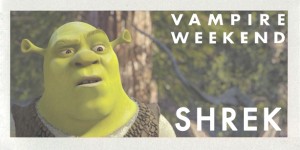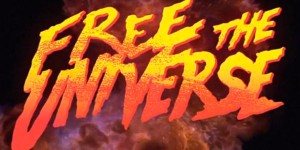Vampire Weekend's empire state of mind
by Mark Teo
May 14, 2013
If there’s one thing American bands love singing about, it’s America.
If there’s one thing American bands love singing about, it’s America. Some albums, like Springsteen’s Republican-baiting Born in the USA, use it to critique the nation. Others, like Dan Deacon’s America, revel in its sprawling, awe-inspiring diversity. Even Titus Andronicus’s The Monitor went into Civil War-reenactment territories, using historical context to explore modern U.S. narratives. Yet in most cases, songs about America try to capture nationhood in broad strokes: They attempt to paint America in totality, which is an impossible proposition at best.
With Modern Vampires of the City, Vampire Weekend doesn’t even attempt to grip the national zeitgeist. Instead, on their third LP, they’ve crafted an album less about nation, and more about city. New York City, to be exact. And in the process, they’ve created their most American—and perhaps their best—album yet.
THE NEW AMERICANA
Modern Vampires of the City might be Vampire Weekend’s United States—which, unsurprisingly, happens to be urban—but the band makes one thing very, very clear: This collection of songs isn’t Americana.
“We love American music and Christian music, church music—it’s stuff we’ve loved ever since the beginning,” says bandleader Ezra Koenig. “But these are all things that seem locked in time. To me, that’s what Americana is: It’s a version of American music that has a spiritual or folk element. It’s locked into a set of references. It feels sometimes so boring—it feels over.”
It’s Koenig’s way of saying that they’re not obsessed with writing to templates: Their songs don’t sweep past the deadened factories of Bruce Springsteen’s music, or the rural, haunted crossroads of Robert Johnson. Rather, it centres on modern New York, and unlike other odes to the city, it veers away from painting the town with broad brushstrokes: Modern Vampires characters observe the bustle from the opposite coast, armed with copies of the New York Times. They’re immigrants who struggle to find their place in a new city. They’re girls who find love in midtown falafel shops. And they’re easily Vampire Weekend’s most nuanced characters ever, right down to Diane Young, who—much like its controversial video below—torches a Saab.
“Our music has always had characters in it, and this album is no exception, except now, New York City is the centre of the album,” says Koenig. And, hailing from the city, he adds, he has some added perspective on how its citizens operate. “There’s always anecdotes and glimpses of our lives in our songs. It could be people we know specifically or people that become characters after being born out of the song itself. But that’s what gives the album life—it’s a world in itself.”
One thing’s certain about Modern Vampires: Its characters are fraught with insecurity. Take, for example, “Don’t Lie,” which confronts a generation aging in front of his eyes. (“Does it bother you?” he asks, “The low click of a ticking clock / There’s a headstone in front of you / And everyone I know.”) Then, on “Hannah Hunt,” the band artfully asks questions about an economy in shambles: “There’s no future, there’s no answer,” they sing, “Though we live on the U.S. dollar, you and me, we’ve got our own sense of time.” And it’s put at its plainest on “Finger Back,” where Koenig quips that “the city’s getting hotter like a country in decline.”
So, we ask, is this Vampire Weekend’s way of expressing concerns about the state of the union? “People always ask the question: Is America declining? It’s hard to judge. Every generation believes the world’s about to end,” says Koenig. “In the last 10 years, there’s been comparisons of America to ancient Rome—it’s the idea of being this massive superpower being embroiled in foreign wars and messing up its own economy. Whether decline is going to happen is uncertain, but the feeling of change definitely feels kind of omnipresent.”
WHAT’S OLD IS NEW AGAIN
Much of the reason Modern Vampires of the City feels so American—even if it’s named after a song by Jamaican dancehall luminary Junior Reid, of Black Uhuru—is thanks to its instrumental choices. Unlike the afrobeat backbone of their self-titled debut, which many critics panned as a petit bourgeoisie answer to Graceland, and the colourfully manic Contra, Modern Vampires of the City is built on the tried-and-true instrumental bedrock of soul, R&B, and folk.
“We were using sounds that hearken back to the beginnings of American music: Piano, Hammond organ, upright bass, acoustic guitars. There’s something about the mixture that takes me to a very specific place,” says multi-instrumentalist Rostam Batmanglij. “There’s pentatonic melody that comes from Appalachian music, and it wasn’t even a conscious thing, we realized these pentatonic melodies were coming out towards the end of the songs.”
It’s certainly a marked difference from Contra, which was characterized by Batmanglij’s busy, twinkling guitar fills and über-processed synths. But, adds Koenig, they didn’t want to replicate Contra’s aesthetic, even if it was the album that solidified Vampire Weekend’s place in the pop-culture landscape. “One thing we agreed on was that organic sounds felt fresher to us,” says Koenig. “We were looking for things that were exciting, and we found that in old sounds—the simple sound of a piano, or voices together. That naturally, in some way, points to older music.”
But even on first spin, Modern Vampires uses time-tested instrumentation to create something wholly new. Yet for its fistfuls of Gotham references and pentatonic core, Koenig cautions us that they’re not trying to bottle and repurpose the American zeitgeist.
“During the last election, Sarah Palin was tossing around terms like ‘The Real America,’ and people were up in arms—because what does that mean? But it’s amazing that, for a place that’s so big and diverse, and whose history is tumultuous, that people could still boil down the concept of America, whether it’s music, or people, or history, into a single concept.
“There’s never been a time in American history where it’s made sense to do it. And now, less than ever.”
COMPLETING THE TRILOGY
Modern Vampires of the City is, according to the band, the closing of a trilogy—and, Koenig and Batmanglij add, there was a certain freedom they had while recording their third LP. When you’re penning a debut, there’s a big onus on defining a signature sound. For its follow-up, there’s a lot of pressure to prove you have fresh ideas—and that you’re not a one-trick pony. The pressure on a band to record a third chapter—especially for a band like Vampire Weekend, who now have three distinctly sparkling records to their name—is substantially lessened.
“When you’ve only released one album, people have a very narrow impression of you,” says Koenig. “And with the second album, there’s a sense you need to get it out there really soon. We didn’t waste any time working on Contra.
“But by the time you come to your third album, you don’t worry as much about getting stuff out quickly or if your band’s going to disappear. The question then becomes whether you can make an album that feels fresh to you. It takes some trial and error, but we had a clear idea of how we wanted the record to sound right from the beginning.”
Both Batmanglij and Koenig admit they don’t know which direction the band’s headed in next; for the time being, they’re more puzzled about how they’ll mesh songs from all three albums into a live context. Batmanglij suggests they’ll move to a more guitar-oriented approach—Modern Vampires has the piano as its nucleus—while Koenig suggest that they’ll continue writing “majestic, romantic” songs, which he identifies as a Vampire Weekend strength. This much is certain—if Vampire Weekend has an aesthetic signature, it’s not Afropop. Or Jamaican dancehall. Or synth-pop. If there’s anything they’ll be known for, it’s for their creative restlessness.
“You have to [continually] prove why you still want to make music,” says Koenig. “Because if you start repeating yourself, you’ll just get bored.”

This article originally appeared in the May 2013 Issue of AUX Magazine.
Download and subscribe for free in the app store.
Tags: Music, Featured, Interviews, Ezra Koenig, Vampire Weekend





